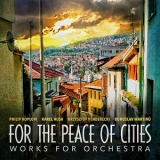 Philip Koplow: For the Peace of Cities + How Sweet the Sound; Karel Husa: Music for Prague 1968; Krzysztof Penderecki: Threnody: To the Victims of Hiroshima; Bohuslav Martinu: Pamatnik Lidicim (Memorial to Lidice); Jorja Fleezanis & James Braid, Violine, Cincinnati Chamber Orchestra, Paul Nadler; Hamilton-Fairfield Symphony Orchestra, Paul John Stanbery; Rutgers Wind Ensemble, William Berz; Polish National Radio Symphony Orchestra, Antoni Wit; Philadelphia Orchestra, Christoph Eschenbach; 1 CD Ravello Records RR8015; Aufnahmen 1999, 2001, 2008, 1998, Veröffentlichung 26/07/2019 (67') – Rezension von Remy Franck
Philip Koplow: For the Peace of Cities + How Sweet the Sound; Karel Husa: Music for Prague 1968; Krzysztof Penderecki: Threnody: To the Victims of Hiroshima; Bohuslav Martinu: Pamatnik Lidicim (Memorial to Lidice); Jorja Fleezanis & James Braid, Violine, Cincinnati Chamber Orchestra, Paul Nadler; Hamilton-Fairfield Symphony Orchestra, Paul John Stanbery; Rutgers Wind Ensemble, William Berz; Polish National Radio Symphony Orchestra, Antoni Wit; Philadelphia Orchestra, Christoph Eschenbach; 1 CD Ravello Records RR8015; Aufnahmen 1999, 2001, 2008, 1998, Veröffentlichung 26/07/2019 (67') – Rezension von Remy Franck

Der amerikanische Komponist Philip Koplow (1943-2018) ist mit zwei Stücken auf dem Album vertreten, For the Peace of Cities und How Sweet the Sound. Das erste ist inspiriert vom Dayton-Abkommen, das 1995 nach dreieinhalb Jahren den Krieg in Bosnien und Herzegowina beendete. How Sweet the Sound, ursprünglich für Solocello geschrieben, ist inspiriert von der Melodie Amazing Grace und enthält Variationen der alten Hymne – wie Koplow sagte: « Jede Variation hat eine neue Tonart, was bedeutet, dass Gottes Liebe und Inspiration allen Menschen zu jeder Zeit zugänglich ist ».
Beide Stücke sind interessant und phantasievoll komponiert, freilich ohne wirklich bleibende Eindrücke zu hinterlassen, trotz der durchaus guten Aufführungen durch das Cincinnati Chamber Orchestra.
Karel Husas ‘Musik für Prag 1968’, das die Zermalmung des Prager Frühlings durch die Sowjetunion thematisiert, ist ein sehr suggestives Werk, reich an eindrücklichen Klangbildern. Dramaturgisch hat es Ähnlichkeiten mit Shostakovichs 11. Symphonie (Das Jahr 1905). Das Rutger Wind Ensemble macht alles, um die Musik wirkungsvoll werden zu lassen.
Martinus ‘Denkmal für Lidice’ erinnert an das Massaker in dieser kleinen tschechischen Stadt, die nach dem Attentat auf Reinhard Heydrich, den ‘Henker’, dem Erdboden gleichgemacht wurde. Antoni Wit dirigiert die ergreifende Musik sehr ausdrucksvoll.
Pendereckis Threnody ehrt die Opfer von Hiroshima. Das Philadelphia Orchestra spielt brillant und spannungsvoll unter seinem ehemaligen Chefdirigenten Christoph Eschenbach, der damit eine tiefschürfende, höchst intensive Version vorlegt, in der die Musik eine packende, ja fast beängstigende Wirkung hat.
The American composer Philip Koplow (1943-2018) is represented here with two pieces. For the Peace of Cities and How Sweet the Sound. The first is inspired by the Dayton Agreement, which ended the war in Bosnia and Herzegovina in 1995, after three and a half years. How Sweet the Sound, originally written for solo cello, is inspired by the melody Amazing Grace and contains variations on the old hymn – as Koplow said: « Each variation has a new key, meaning that God’s love and inspiration is accessible to all people at all times ». Both pieces are interesting and imaginatively composed, without leaving any lasting impressions, despite the good performances by the Cincinnati Chamber Orchestra. Karel Husa’s Music for Prague 1968, which deals with the crushing of the Prague Spring by the Soviet Union, is a very suggestive work, rich in impressive sound images. Dramaturgically it has similarities with Shostakovich’s 11th Symphony (The Year 1905). The Rutger Wind Ensemble does everything to make the music effective. Martinu’s ‘Memorial to Lidice’ recalls the massacre in this small Czech town that was destroyed after the assassination of Reinhard Heydrich, the ‘executioner’. Antoni Wit conducts the moving music very expressively. Penderecki’s Threnody honours the victims of Hiroshima. The Philadelphia Orchestra plays brilliantly and excitingly under its former chief conductor Christoph Eschenbach, who thus presents a profound, highly intensive version in which the music has a gripping, almost frightening effect.
























